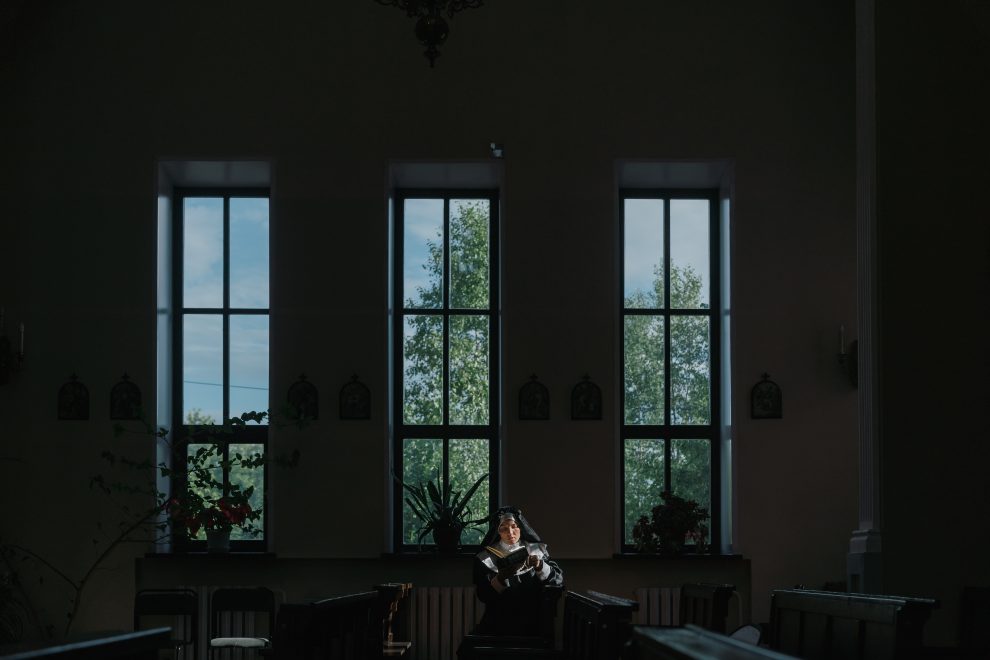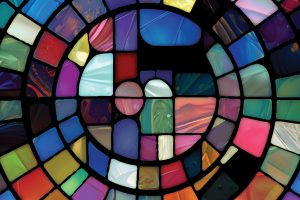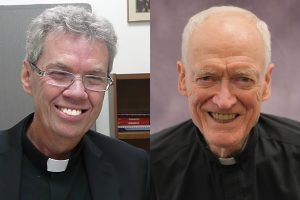Sister Nancy Sylvester has grown accustomed to the fact that life often takes unexpected turns. When Sylvester entered the Sisters, Servants of the Immaculate Heart of Mary at the tail end of the Second Vatican Council, she experienced firsthand a whirlwind change for women religious that dramatically shifted the course of her own life. That change led Sylvester to Washington, where she became immersed in politics and served for 10 years as executive director of the Catholic social justice lobby NETWORK.
But that was only the first leg of her journey. After serving in leadership positions with her own religious order and the Leadership Conference of Women Religious, Sylvester felt called to tackle issues in the church, society, and religious life in a new way. In 2002 she founded the Institute for Communal Contemplation and Dialogue (ICCD) and serves as its executive director In this web-exclusive excerpt from her interview with U.S. Catholic, Sylvester explains how her current work has evolved and the role it plays in the church today.
How did you end up starting the Institute for Communal Contemplation and Dialogue?
It was evolutionary, in many ways. At the end of my time with NETWORK in 1992, I was noticing a shift from my early years in Washington. Things weren’t yet as polarized as they would become, but I was beginning to sense that whom you were aligned with was more important than addressing the issues. There was less and less “crossing the aisle” among the advocacy groups with which we worked. Although political advocacy is important, I knew that it wasn’t enough anymore. Something was missing.
Then I got elected to serve in the leadership of my congregation, and from there I was elected president of the Leadership Conference of Women Religious (LCWR). I served in the presidency for three years, and those years were very significant. We went to Rome each year with our male counterparts in the Conference of Major Superiors of Men and met with the various Vatican congregations or dicasteries to share what was happening with women and men religious in the United States.
During these three years the issues we covered dealt with women’s role in the church, the gay and lesbian issue, as well as a significant issue for male religious mixed communities. This refers to a religious congregation that would have priests and brothers. In mixed communities, no brother can hold an elected position of authority unless all the ordained men are deemed incompetent.
The men have been bringing up this issue every time they visit but this particular year I found the response quite startling. After the issue was raised, one of the senior staff, a cleric himself, pointed his finger at a Franciscan priest, saying, “Would you want to take orders from a brother?”The Franciscan simply said yes.
What I experienced was the clear difference between those who believe that authority comes from ordination and those who believe it comes from baptism. Not exactly the kind of polarity I was experiencing in Washington, but it signaled the growing divide between different world views and theologies which women religious were coming up against. I knew we had to find new ways of being and acting. We had to find new ways of working toward systemic change. That would eventually bring about the founding of ICCD.
How did you work toward change when you were the president of LCWR?
When it came time to prepare for the presidential address in 2000, I wanted to write something really good and positive. “The future of religious life is great.” “This is what we can do,” etc. I had a little group of friends who read it and they said, “That’s OK, but it is not what you’ve really been talking about.”
Finally someone said, “Nancy, it’s in you.” With that, I just fell into a deep place. You could tell it was one of the moments when the ego wasn’t directing me. I just wrote. I was crying and writing. For the next six hours, I just sat there and wrote what would be the presidential address.
“Everything Before Us Brought Us to This Moment” was the title. I basically said that women religious are at an impasse with some in the hierarchical church. All the ways we know how to make change don’t work anymore. In fact, we have to reach into the deepest part of ourselves, the touchstone of our spirituality, in order to imagine new ways.
I chose the word “impasse” because I was influenced by Sister Constance Fitzgerald, a Baltimore Carmelite who wrote in 1983 a great essay called “Impasse and Dark Night.” She wrote about the kind of powerlessness we feel in our society right now, saying it is really like the mystical journey of John of the Cross and the mystical movements of the dark night of the soul. To engage that kind of impasse calls for a very contemplative spirit and needs to be shared in communal contemplation
How was your speech received?
It went well. I was scared getting up to give that talk, because I knew it was different and I wasn’t sure how everybody would respond. Actually, it was overwhelming how positively received it was by young and old, sisters in habits and those not in habits.
What I said resonated with them. I believe it was even more significant that I was the public person who was able to name our experience as women religious within the hierarchical church and to acknowledge that we operate out of very different world views and levels of consciousness.
Following that year, I’d completed my term in the presidency and was no longer holding office in my congregation. I thought, “Well, if I’ve said this to people, I’d better see if I can I do anything about it.” That’s when I decided to start the Institute for Communal Contemplation and Dialogue (www.iccdinstitute.org). The first program was called Engaging Impasse: Circles of Contemplation and Dialogue. I had seven marvelous women whom I invited to help me see if some program could be designed. Some I knew, but others I only knew by name. They included theologians, artists, psychologists, spiritual directors, activists. They all said yes and gave of their time.
I wanted to meet with them to see if this was even possible—can we engage impasse through communal contemplation and dialogue? We had a great meeting, and at the end they said they would help me do this, so I had an incredible team that helped me develop the program.
The proof that the speech was well received was the support I received from women religious both financially and in participating in the Engaging Impasse Circles.
How exactly do the circles of contemplation work?
The process is designed to be an invitation to transformation. Given the critical time we are living in, this transformation is within the broader societal and ecclesial context. It really is an individual transformation within a communal setting. What is important is that it is rooted in a commitment to contemplative practice. Contemplation is an invitation to access the divine within you. It’s a prayer that’s wordless. You’re really trying to become quiet enough to allow your ego to not be in control so that you’re really listening to that space within your soul, your truest self, your divine self. It is the divine presence within you. That is the grounding. And it is not easy and we are not used to doing such a practice.
That is why before coming to the circle gathering participants are invited to read the reflections on the website on contemplation, impasse, and dialogue, and to practice contemplation daily. The program is highly experiential and so that grounding in contemplation is important.
When people are there, we try to give them some skills to assist them. We focus on how to listen and speak from a contemplative heart. In doing so one becomes very aware of one’s biases, assumptions, and operative world views.
Then everyone tells a story about an impasse. The process provides a very safe container to share and be heard. We then explore what common experience is emerging. We do that in a variety of ways using both our right and left brains. Later we explore how we are complicit in the impasse, how we feel about it, what scares us about it, all in a very safe space.
We’re always trying to grow the communal and it doesn’t take too long before everyone sees that their own story is really everybody’s story. It’s pretty phenomenal. In seeing that one is not alone and part of a larger whole something breaks open. We begin to see that we are not going to change the impasse rather we want to engage it from a very different perspective. We reflect on how we can imagine new ways of being and doing. It’s a movement toward a commitment of living, of being in a new way. Contemplation will invite you to change the way you are. It’s not just a set of tools. It’s really an invitation to be and act differently.
We have a book that describes the process, plus it includes reflections by a number of participants. It is called “Crucible For Change.” It’s available on our website—we sold out of all the hard copies but we have it available for download (for ordering information, see www.iccdinstitute.org/crucible-for-change/).
A lot of Catholics today might feel that there is an impasse within the church. Can people use some of these principles and practices you’ve developed in their own lives when they feel they have reached an impasse?
Yes, for sure. But one thing I want to make clear is that not every conflict is an impasse. We often have lots of conflicts in our lives. Impasse is when you face the fact that you’re in a new place and all the things you knew about how to change it aren’t working. You’ve got to face into your powerlessness. And make a commitment to contemplative practice.
Beside the reflections on the website and the Engaging Impasse process, ICCD offers a one-day program called “Transformation in a Time of Uncertainty” which can also be very helpful. It is a day program which includes a presentation as to why we are feeling such dissonance and why we need to address the polarities we are experiencing. We practice contemplation and discuss why that is a very needed practice for people of faith. We show how it invites us to explore new ways of coping with our lives and communicating with those who are at different stages of consciousness and hold different world views.
There are other programs we are developing that could also be helpful, like the ICCD Contemplative Sitting Network. These are women and men from around the globe who have committed themselves to sit for 20 minutes every morning between 6:00-7:30 in whatever time zone they live in. They engage in contemplation with the intention of both personal and communal transformation and they do it knowing they are part of this larger field of prayer and energy.
It is very exciting to see so many people hungering for a deepened spirituality and who are willing to engage that as part of their evolutionary journey.
This is a web-only sidebar that accompanies, “From piety to politics: The evolution of an American sister,” which appeared in the January 2014 issue of U.S. Catholic (Vol. 79, No. 1, pages 12-16).
Image: Mikhail Nilov via Pexels













Add comment